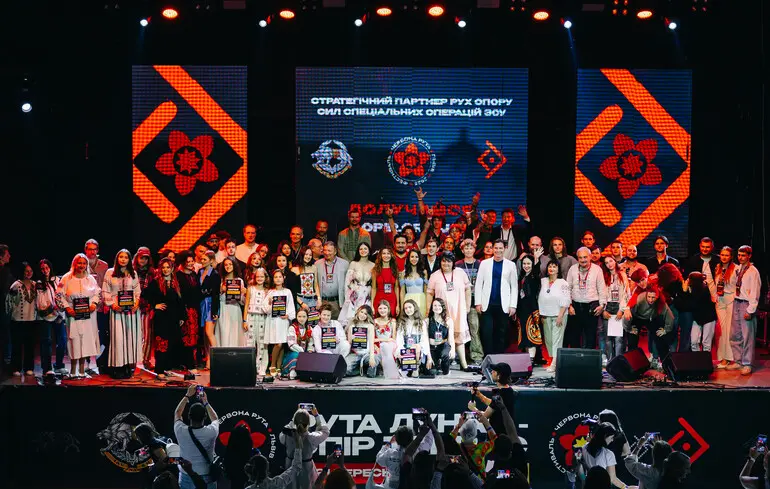Chervona Ruta»: Cultural Resistance and Unity of the Ukrainian Nation in Times of Trials

In September 1989, a landmark event for the development of Ukrainian cultural identity took place — the large-scale open-air music festival «Chervona Ruta» was held at the Bukovina Stadium in Chernivtsi.
This daring event, which faced immediate opposition from Soviet authorities, became a symbol of national revival and cultural independence.
The folk song «Still not dead Ukraine, glory and freedom» was performed here for the first time, waving proudly alongside flags of blue and yellow, transforming into the national anthem of a resilient Ukraine fighting for its future.
Despite systematic pressure and bans from the authorities, «Chervona Ruta» in 1989 emerged as a phenomenon that gathered thousands of young Ukrainian musicians and performers from all regions of the country.
It marked the beginning of a new era where future stars of Ukrainian music started their careers — from Andriy Zdankyn and Vika Telnyuk sisters to Irina Bilik, Taras Chubay, and bands like «Vopli Vidopliassova» and «Gadyukini».
These artists became symbols of a new cultural wave and resistance through music, as their patriotic songs gained swift popularity both within Ukraine and among the Ukrainian diaspora.
Over the years, the festival served as a launchpad for discovering many talented artists across genres such as folk, rock, pop, and dance music.
Many of them, including bands like «Khorta» and «Dance Music», became well-known figures representing Ukrainian culture internationally.
The festival was temporarily paused during the COVID-19 pandemic and due to Russia’s full-scale invasion of Ukraine, but in 2025, it was revived and hosted in Lviv on the avenue named after Vyacheslav Chornovil, a symbol of Ukraine’s ongoing struggle for independence and territorial integrity.
Over five days, contemporary Ukrainian music resounded across venues — from folk and pop to heavy rock and military songs that embody the indomitable spirit of resistance.
The grand final concerts and award ceremonies drew hundreds of performers from all over Ukraine and abroad.
Among the honored guests was Darka Stebivka, a winner of the first «Chervona Ruta» in 1989, who returned after many years as a special guest.
The themes of cultural resistance permeated throughout — on stage, in discussions, and panels held in the «Malevych» hall, where historians, public figures, and military personnel engaged in dialogues about Ukraine’s historical and contemporary fight for freedom.
Through music, original songs, and symbols, the Ukrainian people demonstrate their desire for sovereignty, spiritual resilience, and the ongoing struggle to preserve their identity.
These cultural expressions prove that Ukrainian music is not only a reaction to external oppression but also a powerful driver of social change, inspiring future generations.
Ultimately, «Chervona Ruta» remains an essential platform for preserving, consolidating, and developing Ukrainian culture during the most turbulent times in the nation’s history.

